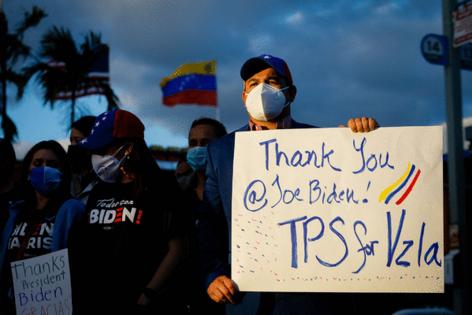Trump administration asks Supreme Court to allow revocation of TPS for Venezuelans
Published in News & Features
After losing key legal battles, the Trump administration on Thursday asked the U.S. Supreme Court to reverse a federal judge’s decision protecting hundreds of thousands of Venezuelans in Florida and other states from being deported while they sue the government.
The high-stakes appeal by the administration’s solicitor general could have serious consequences for one group of Venezuelans whose Temporary Protected Status was set to expire in April under an order by the Department of Homeland Security. The same immigration protections for another group are set to run out in September.
Before its term ended, the Biden administration extended those deadlines until October 2026, but Homeland Security Secretary Kristi Noem revoked that policy, leading to a lawsuit filed by Venezuelan immigrant groups in San Francisco federal court challenging her decision.
In its petition to the Supreme Court, the administration argues that the court has no authority to review Noem’s decision revoking TPS protections for Venezuelans who fled the oppressive regime of President Nicolas Maduro. Despite the exodus of millions as Venezuela’s economy collapsed, Noem recently found that those protections for Venezuelan immigrants run “contrary to the national interest” of the United States.
“The court’s order contravenes fundamental Executive Branch prerogatives and indefinitely delays sensitive policy decisions in an area of immigration policy that Congress recognized must be flexible, fast-paced, and discretionary,” Solicitor General John Sauer wrote in the 41-page petition to the Supreme Court.
The petition was prompted by a federal appeals court’s ruling in April that upheld the federal judge’s decision blocking Noem’s revocation of deportation protections for Venezuelans in the United States.
The appeals court in San Francisco backed U.S. District Judge Edward M. Chen’s decision rejecting the government’s request to lift his stay of the revocation order. In March, Chen found that Venezuelan nationals with Temporary Protected Status in the United States could be “irreparably injured” if he did not put a hold on their deportations.
Chen ruled that Noem had acted on broad generalizations and stereotypes when she revoked the deportation protections and work permits of about 350,000 Venezuelans benefiting from TPS.
“It is evident that the Secretary made sweeping negative generalizations about Venezuelan TPS beneficiaries,” the judge said in a 78-page order on March 31. “Acting on the basis of a negative group stereotype and generalizing such stereotype to the entire group is the classic example of racism.”
In April, administration lawyers asked Chen to put his stay ruling on hold so that the U.S. Court of Appeals for the Ninth Circuit in San Francisco could consider the order revoking the TPS extension issued by Noem in February.
The panel of three appellate judges ruled: Trump administration officials “have not demonstrated that they will suffer irreparable harm” if a lawsuit brought by Venezuelan immigrants challenging Noem’s order continues in federal court.
Lawyers for the Trump administration argued that Noem has the exclusive power to revoke the Biden administration’s TPS order for Venezuelan nationals in the United States and that the plaintiffs don’t have rights under their “equal protection” argument to challenge her authority.
Government lawyers said Noem’s “determinations are immigration policies rationally related to legitimate governmental interests and were not motivated by racially discriminatory intent,” despite what Chen found in his initial ruling. They said the judge’s postponement of Noem’s order “imposes irreparable injury” to the executive branch and the public, asserting that Venezuelan Tren de Aragua gang members “were covered” along with other Venezuelan nationals by the Biden administration’s TPS order in 2023.
Venezuelans who sued have provided significant evidence that TPS holders and their families would suffer irreparable harm if the revocation was allowed to go forward, Chen found.
“In contrast, the government’s contention that the public interest weighs in its favor is not convincing because the government lacks any evidence of national security harms,” the judge added.
His ruling, stopping the TPS revocation while the lawsuit plays out in his court, was a blow to the Trump administration. It has targeted Venezuelans as part of mass deportation efforts through several policies and argued that allowing people from Venezuela, in the midst of humanitarian and political crises, into the U.S. goes against American interests.
Days before he left office, President Joe Biden had extended TPS for Venezuela for an additional 18 months. But weeks into Trump’s second term, Noem revoked the TPS extension for a large group of Venezuelans, effective April 7. The decision would have meant that as many as 350,000 Venezuelans, many of them living in South Florida, would have lost the ability to legally work in the U.S, and a few days later would have been vulnerable to detention and deportation. Another 250,000 Venezuelans with TPS would face the same fate in September under Noem’s policy, though that group is not affected by the case in San Francisco.
A group of seven Venezuelans facing deportation, along with an advocacy group named the National TPS Alliance, sued the Trump administration in the San Francisco federal court on Feb. 19, arguing that its decision to end deportation protections for Venezuelans is unlawful, politically motivated, racially discriminatory, and part of a broader pattern of bias against non-European, non-white immigrants.
The plaintiffs are represented by the Center for Immigration Law and Policy at UCLA School of Law, the ACLU Foundation of Southern California and the National Day Laborer Organizing Network.
_____
©2025 Miami Herald. Visit miamiherald.com. Distributed by Tribune Content Agency, LLC.







Comments